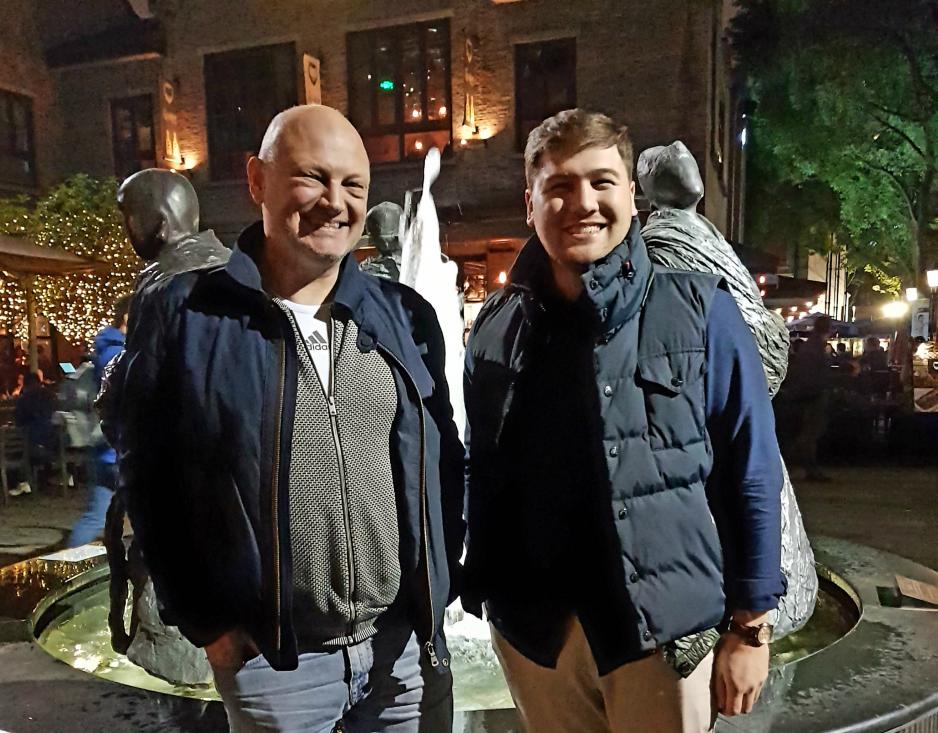Editorial: On Being a Proud ‘Vesteråling’ in China

Shanghai: The international north was put on hold when the sanctions against Russia were introduced. Then came Donald Trump, who continually threatens to choke international trade. Meanwhile, China is open for trade again – and the forward-leading industry in the north is waiting impatiently.
I was at a café in Shanghai the other day with Geir Wold, investor and founder of Vesteraalen’s fish products in Sortland, northern Norway, and his Chinese colleague Floris Vaessen.
The surroundings were unusual, but Wold is like most North Norwegians. Wearing a t-shirt and a fleece jacket, he is ready to conquer the Chinese market. He had already started, long before Norwegian authorities started talking with their Chinese colleagues.
Factory for China
It has taken three years to get to where he is at today.
Back home in Sortland, a factory that is to supply the Chinese market with fish products is nearly complete.
Geir Wold and his partners have put NOK 250 million ($ 30 million) into this adventure.
And they are almost there.
Impatient customers in China are eagerly awaiting the finishing of this North Norwegian initiative.
As a child, I was often on the docks by Vesteraalen’s Canned Goods factory in Sortland.
Well, that’s not quite true. I was underneath the docks.
We would balance on slimy green lumber logs that would only be available at low tide.
We were fishing.
Our fishing equipment was homemade and we tried catching a fish whose official name I do not know. It was inedible, as was much else coming from the sea at that time. Today it is probably a delicacy. The myth claimed that this rather ugly, spiky fish fed on silver-colored coins. The spikes were to kill us if we touched them. The fish bellies allegedly hid pennies, a most valid currency for children who were barely old enough to get a weekly allowance and thus worth risking our lives for. Under the docks we were invisible for all, including our parents, who thought we were at some field playing football.
Treasure hunting
Revealing our treasure hunt would lead to our being grounded and to our fishing gear being confiscated, gear that was primitive, yet to us technologically perfect.
Vesteraalen’s Canned Goods factory produced green cans with fish balls inside, and they were the pride of Sortland at a time when I truly and proudly would refer to myself as ‘Vesteråling’; a person coming from the Vesterålen region in northern Norway. The recipe for the fish balls was surrounded by secrecy; however, according to Geir Wold there was no secret other than using top-quality fresh raw materials.
The cans from Vesteraalen’s are still to be found in shelves at the shops. In an increasing number of shops, actually, and with an ever-increasing market share.
Vesteraalen’s also produces top-quality fish oil.
No, not cod liver oil, but oil filling design bottles sold online.
Most of the fish that is landed in Sortland is processed and climbing the value chain.
And now it is heading for the Chinese marketm, as soon as the new factory is finished and the Norwegian and Chinese food authorities have joined forces in joint regulations. There is good will on both sides; however, such technicalities necessarily take their time.
Too much time, according to business people who are eager to reap the benefits from the capital they have invested.
The new factory built in Sortland will be one of the most modern fish-processing plants in the world when it is finished.
Competitive salaries
Through extensive automatization it also moves the boundaries of what is industrial possible in the High North.
The Norwegian ‘handicap’ of high costs, in particular when comparing salary levels with China and other countries, is more or less eliminated through technology. That does not mean that Vesteraalen’s and others who put new technology into use do not have to offer competitive salaries. It just means that there is a demand for a different kind of work force in tomorrow’s job market. It is about engineers and others with higher education, and Norway does not have the highest salaries for these professions.
Competence may come cheaper in Norway than in other countries.
In Sortland, we see investment in high-competence jobs, and we see investments into a gigantic Chinese food market.
Hard work, solid analyses and heavy investments lie behind such a major initiative from the founders in Vesterålen. Geir Wold and his co-workers and co-owners have every possibility to succeed against this backdrop.
They invest aggressively, based on a historic tradition of a company holding rich traditions.
It is not hard to re-live the old sense of pride that came from being able to balance on the logs underneath the docks of Vesteraalen’s Canned Goods back in the day.
We never caught any fish with pennies in their bellies. But no one could crush our dreams.
And we never gave in.
Nor does, fortunately, Vesteraalen’s.
Have a great weekend!
(This editorial originally appeared in Norwegian and has been translated by HNN's Elisabeth Bergquist.)
Les kommentaren på norsk
